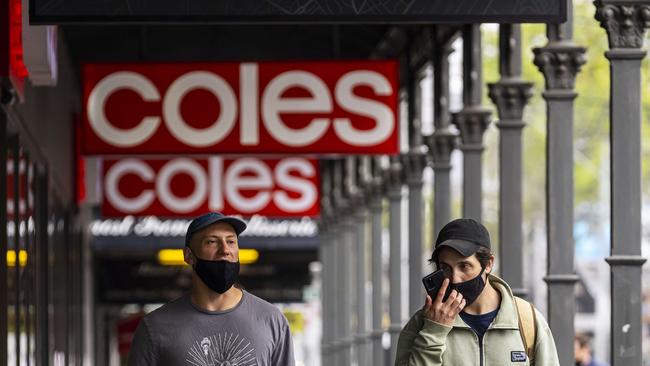Woolworths and Coles could have seen their peak profit margins in 2023, warns JP Morgan
Amid rising political heat on bumper supermarket profits, a top investment bank warns Woolworths and Coles might have witnessed peak profit margins in 2023 with profitability weakening for the next two years.

Business
Don't miss out on the headlines from Business. Followed categories will be added to My News.
The nation’s top supermarkets, Woolworths and Coles, could undershoot profit expectations over the next two years as the sector faces an uncertain outlook amid heightened regulatory and political scrutiny that is threatening to place a downward pressure on grocery prices and squeeze profit margins.
The political pressure from six grocery price inquiries, including one led by the Australian Competition & Consumer Commission, is likely to add to the noise around high grocery prices, which could in turn force the supermarkets to further cut shelf prices at the cost of profitability.
Indeed, 2023 could have seen the peak for supermarket margins.
A slowdown in food inflation will also play a part, with cheaper food and grocery prices good for consumers but at the same time giving little space to move to grow profits for the chains.
In a fresh report on the sector from investment bank JP Morgan, analyst Bryan Raymond has warned clients of the investment bank that he continues to see downside risks to consensus earnings forecasts, mainly in fiscal 2025, where he has pencilled in earnings per share that is 4.7 per cent and 7.5 per cent below consensus for Woolworths and Coles, respectively.

The political firestorm now raging around the supermarkets, fuelled by attacks from politicians over allegations of price gouging, and the focus of a string of public inquiries has placed a spotlight on Woolworths and Coles, the prices they charge and the profit they make.
Add in the weight of rising costs such as wages and utility bills, and supermarket profits are under pressure. Mr Raymond has profit margins for both supermarket heavyweights sliding between now and fiscal 2025.
“The supermarket industry is facing an uncertain outlook for 2024, amid heightened regulatory and political scrutiny as six grocery price inquiries are likely to drive a negative news cycle, contributing to poor price perception, which will likely weigh on gross margins and price inflation,” Mr Raymond said.
“Sales are normalising as high inflation gives way to potential deflation, while margins are likely to contract as cost growth remains elevated.
“We forecast Woolworths EBIT margins to contract from 6 per cent in fiscal 2023 to 5.9 per cent in 2024 and 5.8 per cent in 2025. Coles is stepping down from 4.8 per cent in fiscal 2023 to 4.6 per cent in fiscal 2024 and 4.5 per cent in fiscal 2025.”
Mr Raymond argues that industry sales growth is set to slow to 3.5 per cent in April 2024 from current levels of 3.8 per cent in November 2023 and maintain the range of 3-3.5 per cent in the outer months as food disinflation (the temporary slowdown in prices) and lack of offsetting mechanisms through pricing is unlikely given the current regulatory scrutiny.
Both supermarkets will report their first-half results next month, with the company’s profit margins and profits to be dissected by investors who are looking to maximise their returns but politicians and members of the Albanese government looking to score political points by attacking the chains.
On Monday, Woolworths got ahead of the profit result by issuing a surprise trading update that saw it reveal $1.45bn in impairments to its New Zealand supermarkets chain and a $209m loss on its shares in Dan Murphy’s owner Endeavour Group. Although a non-cash writedown, it will drastically reduce the headline profit for Woolworths and could even see it report a loss for the half.
Mr Raymond said the inflation outlook was on the precipice of a slowdown in inflation from current mid-single digit levels to low single digit inflation in the fourth quarter of 2024.
“This translates into the potential for modest deflation for Woolworths and Coles, on their definition of inflation over the final 9 months of 2024. We expect a return to deflation to be seen as a negative signal for margins, given high wage inflation. In our view, modest deflation of this magnitude should not be surprising after two years of elevated inflation.”
Mr Raymond said Woolworths and Coles have likely seen margins peak in fiscal 2023, as he expects a 10-20 basis points of EBIT margin contraction in fiscal 2024, driven by wage cost growth ahead of inflation, and diminishing gross margin expansion.
“We do not factor in any discrete impacts from regulatory change or price investment in an uncertain political and regulatory environment with six inquiries into grocery pricing underway.
“While a material financial impact from these inquiries is not our base case, we believe the market is underpricing the risk of either pre-emptive investment in value from the supermarkets, or a more challenging regulatory backdrop long term. In our view, the former is more likely.”
More Coverage
Originally published as Woolworths and Coles could have seen their peak profit margins in 2023, warns JP Morgan





